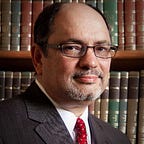History of Thomas Jefferson
Perhaps no one person is more associated with the 4th of July in American History than Thomas Jefferson, probably because it was his hand that penned the immortal Declaration of Independence.
As my friend Clay Jenkinson — who has been portraying Jefferson for over 20 years — says in his book Thomas Jefferson: The Man of Light:
“The Third President is the Muse of American life, the chief articulator of our national value system and our national self-identity. Jefferson was a man of almost unbelievable achievement: statesman, man of letters, architect, scientist, book collector, political strategist, and utopian visionary. But he is also a man of paradox: liberty-loving slaveholder, Indian-loving relocationist, publicly frugal and privately bankrupt, a constitutional conservative who bought the Louisiana Territory in 1803.”
Francophile
Even by 1782, as an admiring French visitor observed, Jefferson, “without having quitted his own country,” had become “an American who … is a musician, draftsman, astronomer, natural philosopher, jurist and a statesman.” He knew about crop rotation, Renaissance architecture, could dance a jig, play the fiddle, or tie an artery.
Jefferson in ParisJefferson both loved and hated his time in France. He went to Paris in 1784 to succeed Benjamin Franklin as American Ambassador following the 1783 peace treaty negotiated with England and dealt with repayment of French loans to the U.S. as well as with attacks by North African pirates on American ships.
A statue of him (at right) currently appears along the Seine River in Paris in front of the Hôtel de Salm (next to the Musee d’Orsay) which served as the model of Monticello, the home he built in Virginia. During the construction of the Hotel, Jefferson would watch for hours and said he was “violently smitten with the Hôtel de Salm.” He loved the culture, civilization, wine and classical architecture of France bringing some of it home saying
“I do love this people with all my heart”
but was uncomfortable with the French social milieu and was scandalized by the lack of domestic morality among French aristocrats.
Founding Fathers Friendship
Though friends in their youth, disagreements separated Thomas Jefferson and our second President John Adams in later years. They were eventually reconciled toward their twilight years, and though they never saw each other again after Adams left the White House to be replaced by Jefferson, in the last 14 years of their lives, they exchanged 156 letters, some of them quite warm. This correspondence is generally regarded as the intellectual capstone to the achievements of the revolutionary generation and the most impressive correspondence between prominent statesmen.
They both died on the same day, July 4th, the 50th anniversary of the Declaration of Independence, two of the last three signers. At the age of 91 John Adams collapsed in his favorite reading chair and died that afternoon, his last words are often reported to have been,
“Thomas Jefferson still lives.”
However, though this story appears even in contemporaneous obituaries, eulogies, and biographies — even as recently as David McCullough‘s popular biography of John Adams — his spinster niece and adopted daughter Louisa Smith recalls only that Adams mentioned the name, Jefferson. Adams died at about 6:20.
But Jefferson might have said “Wrong, as usual,” if he had still been alive. However, in his last days, his health had failed, and he passed in and out of consciousness. Shortly before midnight on the 3rd of July, 1826 Jefferson asked his doctor one last time
“Is it the 4th?”
with his doctor replying “It soon will be.” Later around 1 pm on the 4th just a few hours before Adams died — in his home in Monticello, Virginia — surrounded by his daughter and some special slaves, at the age of 83, Thomas Jefferson died.
Bill Petro, your friendly neighborhood historian
www.billpetro.com
If you enjoyed this article, please consider leaving a comment, or subscribing to the news feed to have future articles delivered to your feed reader, or to your email.
